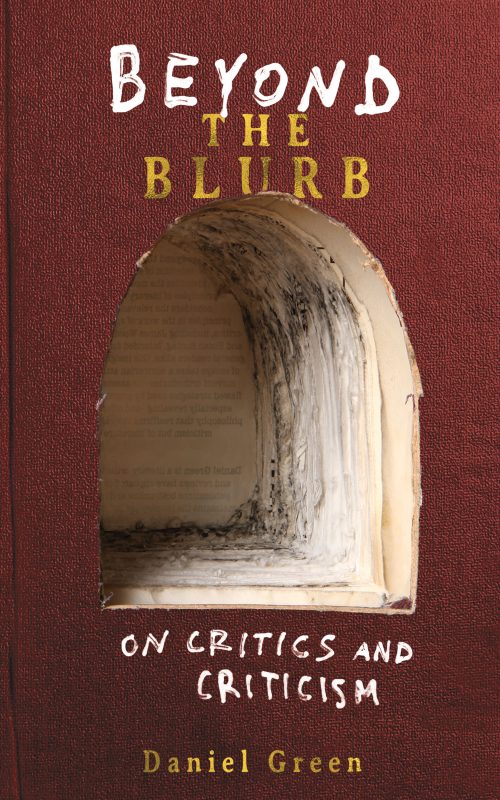As a young man, Daniel Green had hopes for academic criticism, but as this excerpt — take from his essay “Blogs and Alternative Literary Criticism” — shows, he had to set those hopes aside, as more and more academic criticism tended to subordinate literature to political and theoretical agendas. Later, weblogs, too, disappointed him because they pursued sensational or trendy books instead of considering literary works in depth. —Jeff Bursey
.
I aspired to become an academic critic precisely because so much general interest criticism was focused on the “mushy middle” of literary fiction and avoided the books I was most interested in reading. Academic journals were much more likely to feature experimental and unconventional writers (some journals concentrated exclusively on such writers) and gave them more than the cursory treatment afforded by most book reviews. Academic criticism no longer manifests these virtues, however. It is as agenda-ridden as literary journalism, although its agenda emphasizes a different kind of propriety, the propriety of political and cultural analysis (in its way similar to the kind of analysis favored by the New York Intellectuals). And while academic journals continue to offer longer and more sustained commentary, this commentary is more concerned with context—historical, culture, theoretical—than with the text, the latter serving only to illuminate the former. Academic criticism of contemporary fiction no longer provides a more rigorous, expansive, open-minded alternative to the popular reviewing media. For text-based criticism, the general interest book review is what we’re stuck with.
At one time I held out hope that the “literary weblog” would provide a plausible alternative to print book reviewing. I still think that, in theory and potential, blogs could still be perfectly good sources of serious literary criticism. There is nothing in the nature of the cyber medium that precludes the blog from being the publishing vehicle for serious writing of any kind. If serious critics, facing the likely demise of newspaper and magazine reviewing in the not distant future, turn to the cyber/blogosphere as an available substitute, literary criticism will flourish well enough. Such book reviewing sites as The Quarterly Conversation and Full Stop have already demonstrated that online reviewing can be just as credible as print reviewing, in many cases going far beyond, both in length and in critical heft, what is offered in all but the most studious general interest print publications. They are also much more likely to cover experimental and translated works and books from independent presses, which are at best sporadically reviewed in mainstream print book review sections. Unfortunately, it cannot at this point be said that the literary blog has validated hopes it might sustain a form of general interest criticism that could replace, perhaps even surpass, what is left of print criticism. There are indeed some very good literary blogs offering worthwhile criticism, but on the whole the literary blogosphere has become largely an echo chamber for book business gossip, pseudo-literary trivia, and the establishment perspective. Literary blogs have become not an alternative to the established critical order but part and parcel of it.
Those blogs now calling themselves “book blogs” in particular have pledged themselves to this order. Mostly devoted to superficial appraisals of potboilers and best-sellers, these blogs actively seek to be conduits of publishing propaganda (in the guise of “promoting” books). They have apparently become the most popular type of “literary” blog, and if “book blog” eventually becomes the name applied mostly to such weblogs, the future of literary criticism online is bleak indeed. But even those still self-identifying as “literary blogs” have settled in to an overly cozy relationship with both publishers and the print reviewing media. (Many of the bloggers have themselves sought out reviewing opportunities in the print media, as if the ultimate purpose of creating a literary blog was after all to attract enough attention to catch on as a newspaper reviewer). While in general one does get from literary blogs a fuller sense of the diversity of fiction available to readers (more emphasis on independent presses) than from the print book reviews, too many of the posts devoted to specific books are discussions of the newest and hottest from mainstream publishers. Much time is spent obsessing over lists of various inane kinds (the Top 10 ____), and in preoccupation with prizes, the dispensing of which apparently substitutes for criticism absent the real thing.
Literary blogs are (unwittingly, I hope) abetting the capitalist imperative to get out “product” as quickly as possible. New books appear, are duly noted, presumably consumed, and then we’re on to the next one. While sometimes lit bloggers consider an older title, it’s usually by an already established author or a “classic” of one sort or another. Little time is spent considering more recent books that might not have gotten enough attention, or assessing a writer’s work as a whole. Once the book has passed its “sell by” date, nothing else is heard of it and every book is considered in isolation, as a piece of literary news competing for its fifteen seconds. The more potential readers come to assume that this is the main function of lit blogs, the less likely it is that the literary blogosphere will have any lasting importance. Literary blogs might let you know who reviewed what in the New York Times, but that The New York Times might not be the best place to go for intelligent writing about books is not something they’ll have the authority to suggest.
—Daniel Green
N5
Daniel Green is a literary critic and sometime fiction writer. His reviews, critical essays, and fiction have appeared in a variety of publications, both online and in print. He has a Ph.D focusing on postwar American fiction and an M.A. in creative writing. His website is http://www.thereadingexperience.net/tre/
.
.

